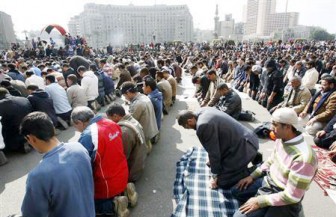CAIRO, (Reuters) – Egypt’s anti-government protesters, scenting victory after President Hosni Mubarak agreed to discuss sweeping political reforms, rallied support for what they hope can be a million-strong march for democracy today.

Mubarak’s newly appointed vice-president began talks with opposition figures and the army declared the protesters demands “legitimate” and said it would hold its fire.
But protesters in Cairo’s Tahrir Square, where thousands kept vigil through the night in defiance of a curfew, vowed to continue their campaign until the 82-year-old Mubarak quit.
“The only thing we will accept from him is that he gets on a plane and leaves,” said 45-year-old lawyer Ahmed Helmi. The United States and other Western powers which have backed Mubarak throughout his 30 years of rule, have demanded he submit to free elections. Even if he holds out against the calls for his resignation, it seems unlikely he could win a vote.
At least 140 people have died since demonstrations began last Tuesday, inspired in part by Tunisians’ overthrow of their ageing strongman after similar protests focusing on economic hardships and frustration with political oppression.
The army’s pledge to hold its fire was seen as tipping the scales against Mubarak. “Mubarak has become a liability for the institution of the army,” Fawaz Gerges of the London School of Economics said. “And so it is becoming more difficult by the day for Mubarak to remain in office.”
For the military establishment, which has run Egypt since its officers ousted British-backed King Farouk in 1952, the aim may be to provide reforms that preserve military influence.
For Washington and Mubarak’s allies in Europe, as well as Israel, attention will focus on how far Islamist groups, notably the hitherto banned Muslim Brotherhood, can gain power in any new Egyptian political system.
Israeli Prime Minister Benjamin Netanyahu, used to calm on his southern border since a 1979 peace treaty with Cairo, said Egypt could turn into the kind of militant theocracy installed in Iran that same year.
BROTHERHOOD SAYS ALL MUBARAK MEN MUST GO
The Brotherhood, which says it wants a pluralist democracy, has taken a cautious approach to joining in protests led by the young and the urban professional classes.
But it said yesterday it was calling on people to continue protests until the whole establishment departed — “including the president, his party, his ministers and his parliament”.
In the second city, Alexandria, thousands of people gathered near the main railway station, many with food and blankets, saying they would join today’s “march of a million”.
Officials said rail services would be disrupted on Tuesday by curfew orders, which may keep some people away from protests.
Newly-appointed Vice President Omar Suleiman appeared on state television yesterday to say Mubarak had asked him to begin talks with all political forces on constitutional and other reforms. The channel later said talks had begun.
Suleiman, an intelligence chief named on Saturday, also said a new government sworn in by Mubarak on Monday would fight unemployment, inflation and corruption.
The United States said Mubarak must also revoke the emergency law under which he has ruled since 1981. Washington has sent a special envoy, former ambassador to Cairo Frank Wisner, to meet Egyptian leaders.
“The way Egypt looks and operates must change,” said Robert Gibbs, spokesman for President Barack Obama.
Western powers have been caught off guard by the speed with which Mubarak’s police state has been pushed back by furious but unarmed citizens. Some analysts believe the army is now seeking a face-saving way to have Mubarak leave.
A presidential election due in September might give Mubarak the opportunity simply to say he will not run again. But such a tactic may underestimate the desire on the street to see him go. “It won’t work. These are stalling tactics. I don’t think Mubarak quite realises the gravity of the situation,” said Faysal Itani of Exclusive Analysis. “If this deadlock goes on much longer there could be a further breakdown of order.”
At Cairo University, politics professor Hassan Nafaa said: “This all aims to gain time, calm the mood on the street, drive the protesters away and diminish the revolution … The president must end his rule and leave, there is no alternative.”
Foreign governments, meanwhile, scrambled to ensure the safety of their nationals trapped by the unrest in Egypt.
Companies, from gas drillers to supermarkets, also pulled out staff as confrontation brought economic life to a halt. Financial markets and banks were closed for a second day.





